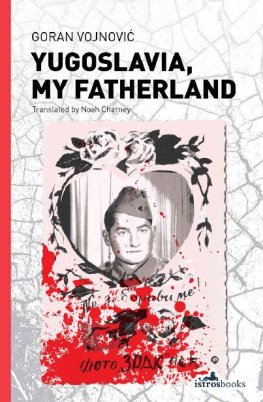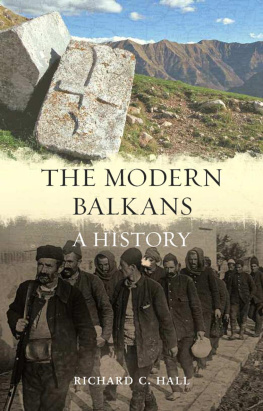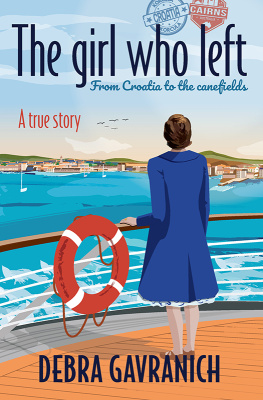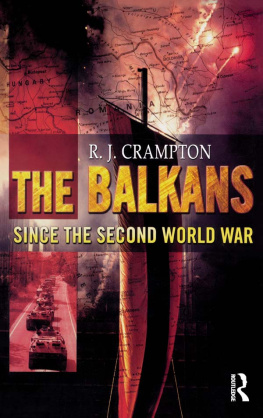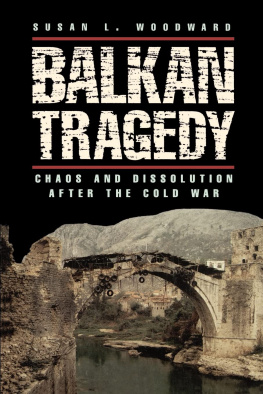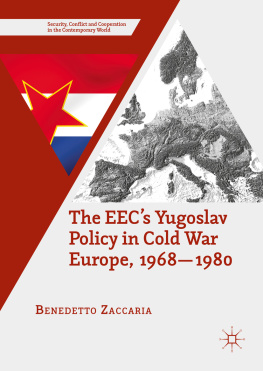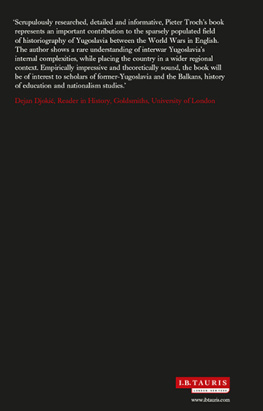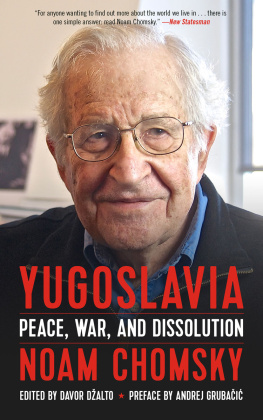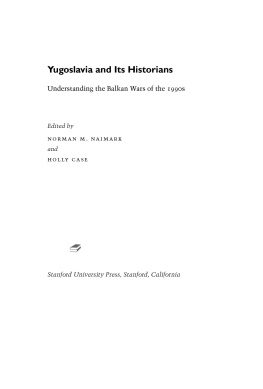Goran Vojnovic
Yugoslavia, My Fatherland

It must have been a normal, early summer day in 1991, when my childhood suddenly ended. The day was heavy and close, and since early morning, the grown-ups had been saying it would rain that afternoon, while the children wondered why people who didnt even have tomatoes or courgettes planted in their gardens, would summon rain in the middle of the prime swimming season. Our world at the time was a far cry from the one our parents seemed to inhabit. For most of us, grown-ups were creatures from a distant planet, only worth noticing if they were missing an arm or a leg, if they had a wild, long beard down to their toes, dressed like an Indian or had tattoos on their backs, or giant biceps like Rambo, with all his sequels.
On that sultry morning we set off to see one of those rare, interesting grown-ups. Mario and Sinisha couldnt believe that I had yet to see the guy with the red lump on his face. It was just a big brain tumour; at least according to some, while others were convinced that it was something called bulimia, a new disease that had recently been discussed on TV, and which turned a persons head into a huge red lump, or so Sinisha claimed. Mario claimed that everyone aside from me had already seen the guy with the lump, while Sinisha recounted one escapade after another featuring Lump Guy as protagonist. According to the biggest bigmouth in Pula, a German tourist took one look at Lump Guy and started to back away from him, and walked backwards the mile or so back to her hotel. An Italian family was even supposed to have notified the police and the Italian embassy in Belgrade about him. Mario and Sinisha both said that I just had to see Lump Guy, cause how often can you see someone with only half of his head normal, while the other half was inflated like a basketball and as red as a sliced watermelon? It didnt take long to convince me and, in no time, we were marching together past the shop and towards the workers dormitory.
A humdrum, white rectangular building housed the guy with the lump, as well as the workers who, following their hard working days at the shipyard, would sit peacefully in front of the entrance, sipping their beers, and chewing over their Bosnian topics. Even though they lived just around the corner from our apartment buildings, they lived in their own parallel and almost invisible world. They fraternized only with each other, and gathered in the evenings in the common room on the first floor of the dormitory to watch the news, a live broadcast of a football match, or some series on national TV.
Along the way, my well informed friends explained that, during the day, Lump Guy vegged out in front of the box and watched TV Zagreb, motionlessly: everything from the domestic family sagas to documentaries picked by the head of Croatian national television. Sinisha told me rumour had it that Lump Guys room-mates had once collected money, bought him a small portable television set and installed it in his room, but he kept hanging out in the common room, though he never spoke to anyone. Mario added that Vaha, the welder, once tried switching the program every ten minutes, but Lump Guy hadnt reacted at all, as if he didnt give a damn what he was watching.
As I listened to these stories, I approached the entrance of the dormitory with high expectations, almost as high as when we set off to visit a circus tent next to the Istra Football Club stadium, on the eve of the circus premiere, to secretly observe performers practice. But before we had crawled through the tall grass and managed to peek inside, a small screaming Gypsy girl scared the shit out of us, and we ran like headless chickens from that tiny black creature.
That day at the workers dormitory turned out wholly different than expected. Instead of encountering a lone guy with a lump, the tiny TV room was packed, everyone staring at the television screen, on which the news was unwinding. The atmosphere was similar to the previous year, when a similar euphoria possessed the single men after Piksis second goal at that unforgettable quarterfinal match of Yugoslavia against Spain. That time, only the police could restore order, and Ramo ended up at the ER, because he had been got an electric shock while French kissing the television set and the antenna.
Twelve months later, Sinisha, Mario and I were looking for the watermelon man in the multitude of supporters cheering on the noon TV news, and were surprised to find that only a small part of those gathered supported the Socialist Federal Republic of Yugoslavia. One could see from afar that the group was led by Milo Lola Ribar, who could down a case of beer solo, and was shouting louder than anyone fuck Yugoslavia, for having bottomed out last year against those Serbo-phobes from Argentina, and that he was no longer interested in the sport. Next to him, and right next to the TV, stood Little Mirso, a sixteen year old with a face more adult than a soldiers and behaviour to match, who warned all those present, in the most serious manner, that sunbathing, ferragosto and fireworks were over in the Arena, but he did not say why. Plenty of amateur screamers were gathered there in the hall of the dormitory, their plain, flat voices forming an incomprehensible wall, even though their flushed faces told us that they were doing their best.
Cera, a famous cinema operator from Pula, stood at the entrance, where it was so crowded that we got stuck, jammed into the bottleneck. Cera used to let us in the Belgrade Cinema for free; calling us his little buddies. At the time, the cinema was usually empty, as all of Pula knew that, after eight oclock, Cera tended to mix up reels and show films from the middle or the end, or sometimes even backwards. But, his love of Istrian brandy, aside, Cera was one of the kindest people I knew. After he saw that none of us even remotely understood what the news was reporting that fateful day, he immediately turned to us and said, The Slovenians can go swim their asses over to Luxembourg, if they dont like it here in Yugoslavia.
It was obvious that Ceras reels got mixed up much earlier than usual that day, so we continued to watch, astonished that this news hypnotized the crowd before us. We all believed that anything, even the TV Calendar would be more interesting than the evening news, even though we didnt understand a word they said. Sinisha and Mario suggested that we hit the road and head towards the apartment building, but I still had this idea that wed find the guy with the lump, so I stepped forward to scour the crowd of ever more frenzied television viewers. Instead of our watermelon man I saw, through the glass wall on the opposite side of the hall, none other than my father, slowly making his way home.
His path home from work usually led him to the dormitory, where he stopped for a while for a beer or two and to hear the days news and its accompanying commentary, often in the company of his favourite, little Mirso. But that day, as Mirso stepped up onto a chair in front of the TV and addressed the gathered crowd with vigour, shouting the time approaches when even the biggest of fools will learn a lesson or two, my father walked away thoughtfully, as if oblivious to what was happening only a few metres away from him.
I tried to muscle my way through the crowd and catch him in front of the entrance, on the far side of the building, but I quickly realized that jostling through this hand-waving mob would soon land me with a labourers slap on the back, or the head. So I doubled back and decided to intercept my father in front of the shop. I could tell that he was dragging himself more slowly than usual, so there was no way he would get away from me. His gaze was empty, like a blind mans, and I stood before the shop and watched as he approached. I felt like he was about to go past me, just as he had passed by the crowd in the dormitory. As my Aunt Enisa would have said, He walked by without so much as a glance. But he did stop, eventually he did, and gave me a bear hug that nearly took my breath away, and under his uniform I could feel his abs, which the military had sculpted for him, and which he enjoyed showing off while wading through the shallows on beach holidays. Mother and I liked to tease him about that, and then he would divert us with some story about the difference in water and air temperature, and how it wasnt healthy to dive into the sea. My father never drank at work, and I heard him say, countless times, that only in Yugoslavia would people drink more while at work than after work, and that this would send the country to an early grave. But that day he held me so powerfully in his muscled arms that I thought, in all seriousness, that he must be drunk.

